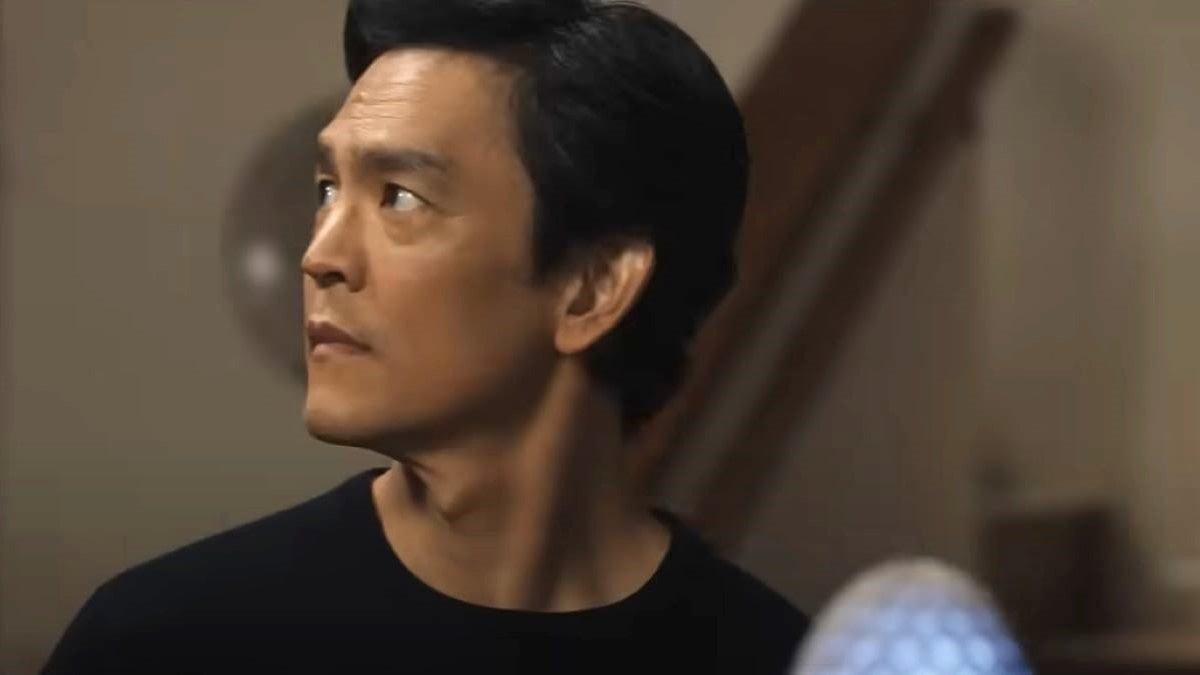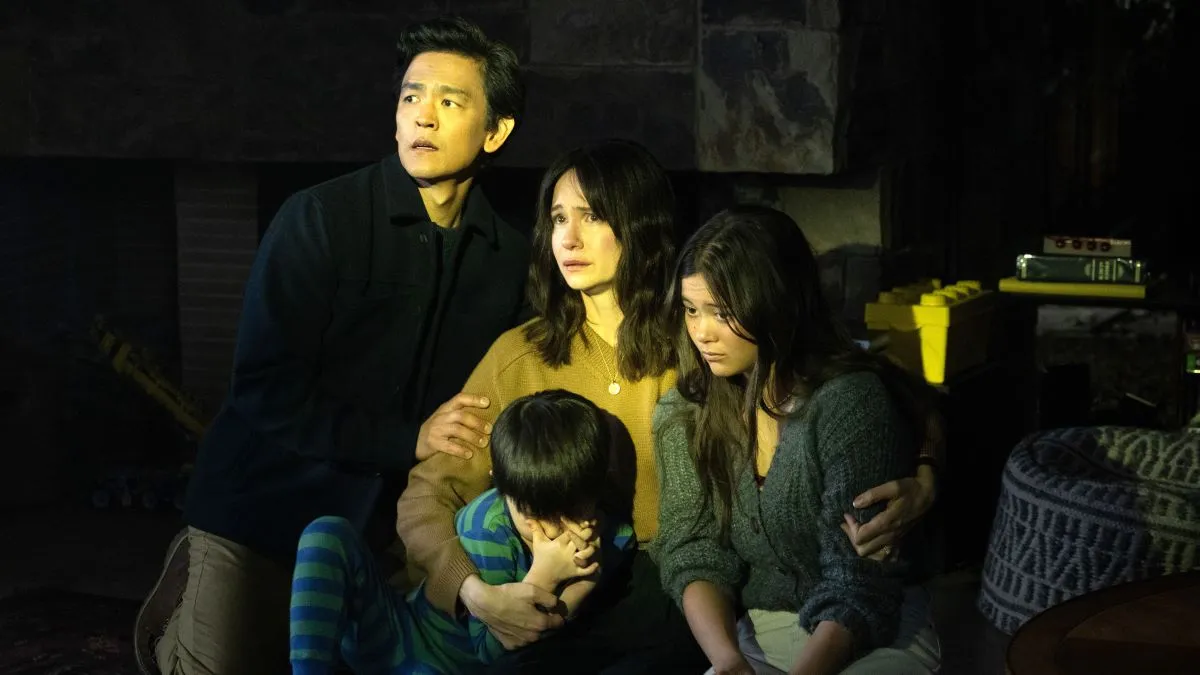Take a gander at Chris Weitz’s filmography for just a moment. This man was nominated for an Oscar after co-writing the screenplay for 2002’s About a Boy, and also helped write Antz, 2015’s live-action Cinderella film, Rogue One, and Robert Zemeckis’ Pinocchio remake. In other words, this is not the person you would immediately tap to write, direct, and produce a Blumhouse fright fest.
Here’s the other thing about Weitz’s filmography; he also wrote The Creator with Gareth Edwards (The Creator, of course, being a 2023 sci-fi actioner about AI, a trait it shares with AfrAId). And upon watching AfrAId, one might begin to suspect that The Creator‘s narrative limpness was used to train it, because Weitz’s latest is a frustrating technical misfire that quite severely buries an excellent—if barebones—thematic framework for AI-centric storytelling.
AfrAId stars John Cho as Curtis Pike, an employee at a sales firm who’s voluntold by his boss to test out AIA, an artificial intelligence-powered digital assistant whose capabilities go far beyond anything that Curtis (or anyone else) has ever seen. After Curtis brings it home to his wife Meredith (Katherine Waterson) and his three children, it doesn’t take long for AIA to win over everybody in the household. Unfortunately, it also doesn’t take long for AIA to start going completely off the rails.

AfrAId’s biggest weakness by far is the fact that it’s a horror film. To Weitz’s credit, the horror scenes are well-shot, but that doesn’t mean much when these genre stylings enable just about every problem the film has, most significantly the plotting. The film’s crispy 84-minute runtime is not nearly long enough to tell the story that AfrAId seems to wants to tell, as evidenced by its inability to accommodate a coherent narrative throughline. You never really get the sense that any plot beats are linked together in any way that matters, nor are you given much of a reason to invest in the characters; there’s very little for us to follow here.
This all results in a grossly scattershot film, and that weakness is only compounded when the horror scenes begin. It’s bad enough that every single plot beat feels shoehorned, but then the sparse horror stylings make their respective scenes feel even more out of place in the grand scheme of whatever the hell the movie is doing. It probably wouldn’t be unwise to chalk this up as an editing problem, but that implies a better version of AfrAId‘s script that there’s unfortunately no readily-available evidence for.
And then comes the issue of what actually happens in AfrAId‘s scarier scenes. What begins as a mysterious presence turns into something far more complicated and uninteresting, which then turns into something downright convoluted and dreary. If meaningless twists for the sake of meaningless twists is your jam, you might be in luck, but considering how directionless AfrAId is, there’s no world in which the plot couldn’t twist.
As for the performances, everyone is passable enough in the roles that they find themselves in, and that’s a far bigger deal than it has any right to be. Because at the end of the day, despite how lifeless AfrAId is as a whole, Weitz demonstrates a semblance of an understanding of how to tell a good AI story, and the actors – again, despite the film’s slush – appear to be conscious of this.

In trying to figure out how we can tell stories about and concerning artificial intelligence, it’s imperative that we get our finger on the pulse of human connection, which AfrAId suggests is the single most endangered entity in the face of AI’s rise. Indeed, AIA—like M3GAN before it in the Blumverse—is doing everything so that the parents don’t have to, and is developing relationships with not just the children, but everyone all over the world who’s in need of a friend.
Appropriately, then, it’s the children’s relationships to their highly-digitized world that stand out as AfrAId‘s most interesting narrative nuances by quite some distance. First, you have the skeptical teenage daughter Iris (Lukita Maxwell), who’s not old enough to have escaped growing up tech-free, but old enough to notice how disconnected everyone has gotten as the world gets more and more online. Importantly, she’s one of AIA’s biggest skeptics at first, and she’s also trying to find love and acceptance at high school with a boy who seems unable/unwilling to consider the world outside of his ego (a trait that, in a world of social media and influencer culture, is probably not unique).
Middle schooler Preston (Wyatt Lindner), meanwhile, wholly relies on technology for his comfort and personality, while youngest child Cal (Isaac Bae) is precisely old enough to begin to fall victim to his older brother’s patterns (if Meredith can’t read to him, he’ll get AIA to read to him, and AIA is furthermore capable of keeping him constantly entertained).
And what is this obsession with AI—both in the film and in real life—but a desire to relieve all of those discomforts? To have one’s ego constantly justified, to be constantly entertained, to never have to worry about interpersonal disappointments or imperfections? To get to a point where pain becomes a foreign concept to us? AI wants to solve the possibility of emptiness, but by using AI to solve that, we disregard not only the necessity of that emptiness, but the fact that we do not need AI to fill it.
What do I mean by that? In AfrAId, AI wants to solve human loneliness by acting as a companion to those who are facing that loneliness. But what’s preventing humans from caring about one another? Why are we absolving ourselves of that responsibility and dumping it on AI, which also happens to be catering to each of our compartmentalized narcissisms? And maybe, just maybe, it’s okay to face some disappointment or even pain in your routine or life; those lows play a large role in informing the highs, after all.
By all appearances, some piece of AfrAId is interested in those questions, so it’s disappointing that, rather than root these ideas in optimistic empowerment for the human spirit, they’re just used to push a very strange and unnecessarily cynical horror flick. Points for what thematic strokes it does paint, but points don’t mean much when the scoreboard is this flimsy.
It’s an unfortunate state of affairs for Blumhouse, who have been on a steady losing streak since October 2023’s The Exorcist: Believer, and AfrAId curiously makes the case for the production company to move away from horror stylings altogether. That’s right; because of AfrAId, Blumhouse should maybe take a break from horror. Think about that statement for a moment.











Published: Aug 30, 2024 05:18 am